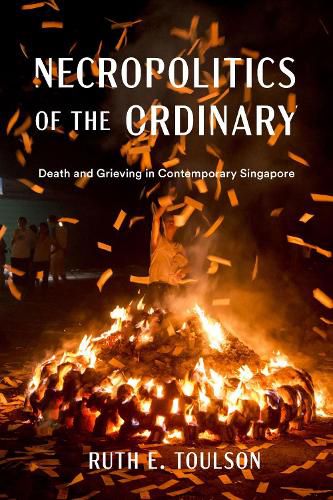Readings Newsletter
Become a Readings Member to make your shopping experience even easier.
Sign in or sign up for free!
You’re not far away from qualifying for FREE standard shipping within Australia
You’ve qualified for FREE standard shipping within Australia
The cart is loading…






Can a state make its people forget the dead?
Cemeteries have become sites of acute political contestation in the city-state of Singapore. Confronted with high population density and rapid economic growth, the government has ordered the destruction of all but one burial ground, forcing people to exhume their family members. In this ethnography of Chinese funeral parlors and cemeteries, anthropologist and trained mortician Ruth E. Toulson demonstrates this as part of a larger shift to transform a Daoist-infused obsession with ancestors into a sterile, more easily controlled "Protestant" Buddhism. Further, in a context where the dead remain central to family life, forced exhumation tears the social fabric, turning ancestors into ghosts. Using death ritual and grieving as interrogative lenses, Toulson explores the scope of and resistance to state power over the dead, laying bare the legacies of colonialism and consequences of whirlwind capitalist development. In doing so, she offers a new anthropology of death, one both more personal and politicized. Written in accessible prose rich with ethnographic detail, the book is suitable for undergraduate teaching in anthropology, Asian studies, religious studies, sociology, and history.
$9.00 standard shipping within Australia
FREE standard shipping within Australia for orders over $100.00
Express & International shipping calculated at checkout
Can a state make its people forget the dead?
Cemeteries have become sites of acute political contestation in the city-state of Singapore. Confronted with high population density and rapid economic growth, the government has ordered the destruction of all but one burial ground, forcing people to exhume their family members. In this ethnography of Chinese funeral parlors and cemeteries, anthropologist and trained mortician Ruth E. Toulson demonstrates this as part of a larger shift to transform a Daoist-infused obsession with ancestors into a sterile, more easily controlled "Protestant" Buddhism. Further, in a context where the dead remain central to family life, forced exhumation tears the social fabric, turning ancestors into ghosts. Using death ritual and grieving as interrogative lenses, Toulson explores the scope of and resistance to state power over the dead, laying bare the legacies of colonialism and consequences of whirlwind capitalist development. In doing so, she offers a new anthropology of death, one both more personal and politicized. Written in accessible prose rich with ethnographic detail, the book is suitable for undergraduate teaching in anthropology, Asian studies, religious studies, sociology, and history.